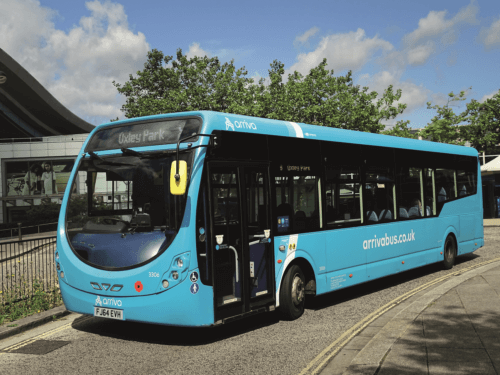
In 2021 Milton Keynes City Council successfully bid for £16m in funding through the Department for Transport’s Zero Emission Bus Regional Access (ZEBRA) scheme. Sixty new electric buses were to be purchased with the money, which would also have included upgrading Arriva’s depot facilities in the city to allow overnight charging.
The Arriva division was part of a consortium that would have made Milton Keynes one of Britain’s first all electric bus cities, but the Deutsche Bahn-owned bus group has pulled out of the group. Labour Progressive Alliance Councillor and cabinet member for climate action and sustainability Councillor Jenny Wilson-Marklew told local news paper the MK Citizen: “Arriva’s decision to pull out of the deal at the eleventh hour is incredibly short sighted. Sadly, this means that there has been a major waste of Council and Government time and resources. It feels like a kick in the teeth as a lot of work went into preparing the bid and rolling out electric buses would have taken us closer to reaching our climate ambitions as a city.
“It’s incredibly disappointing that we won’t be able to bring electric buses to Milton Keynes as quickly as we intended. As a Council, we’ve always championed sustainable transport and improving air quality, with electric buses due to be at the heart of this. We must now go back to the drawing board to find a new partner to deliver green and sustainable transport in our city.”
An Arriva spokesperson said: “We have continued to work constantly in collaboration with Milton Keynes Council over the last year on trying to find a viable way to introduce electric vehicles in to Milton Keynes. We remained open and transparent with the council throughout this time that the bid had several challenges and complexities in its structure, and whilst we have worked tirelessly to find a sustainable solution this regrettably has not been possible. We share Milton Keynes Council’s disappointment, but with the current economic uncertainties and escalating operational costs, it would be irresponsible for us to continue with the bid at this time. We remain committed to Milton Keynes and working in partnership with the Council to serve passengers in the local community. We also remain committed to the decarbonisation agenda which is evidenced by fleet transitions we have been able to successfully implement through a range of sustainable models in other regions.”
Following the decision, Milton Keynes councillors voted to urge the Government to give them the power to run services. The Progressive Alliance, which leads the local authority and is made up of Labour and Liberal Democrat councillors, claimed that the privatisation of public transport was ‘a failed experiment.’ Paul Trendall, Liberal Democrat Progressive Alliance cabinet member for highways, told the BBC that a different model is required: “Something more dynamic, something that uses a more agile fleet, more suited to the needs and the routes” is what is needed, he said. “At the moment we have a one-size-fits-all approach, it is vital we push the Government to devolve more powers to the city council so we can operate and manage our own bus services more effectively.”

